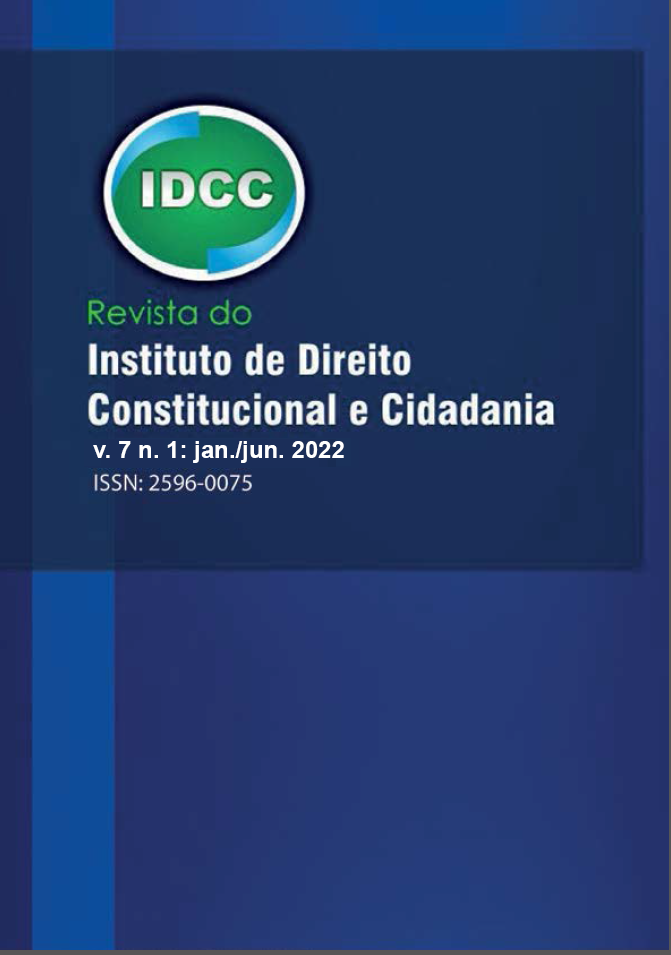An essay on the relations between the Legislative Power and the Judiciary Power from the study of the elaboration process of Constitutional Amendment 116/2022
DOI:
https://doi.org/10.48159/revistadoidcc.v7n1.e052Keywords:
Constitutional Amendment 116/2022, Jurisprudence of the Supreme Court, Separation of PowersAbstract
This article aims to analyze PEC 133/2015, converted into Constitutional Amendment 116/2022, which added § 1º-A to art. 156 of the Federal Constitution to provide for the non-incidence on temples of any cult of the Tax on Property and Urban Territorial Property (IPTU), even if the entities covered by the tax immunity are only tenants of the immovable property. When we observe the justification of the legislative measure, we find several theoretical foundations that supported the legislative initiative. However, these theoretical references, based on the understanding of the Federal Supreme Court, were all presented completely inverted from their original meaning, as if the legislator wanted to create arguments of authority to justify the appropriateness of the desired constitutional reform. The objective of this article is, therefore, to rescue the jurisprudential understanding of the Supreme Court, in particular the Binding Precedent 52, to point out the inconsistencies present in PEC 133/2015 and to discuss whether the binding precedent would also bind the legislative activity. The hypothesis is that, as the understanding of the STF was fundamental and decisive for the approval of the PEC, it would also be necessary for the understanding of the senators to follow that of the Supreme Court. On the other hand, as the Legislative Power created a new jurisprudential interpretation on controversy already defined by the STF, it actually appropriates a function that is not essential to its power. This article is expected to contribute to the reflection on the performance of the Powers, in view of the maintenance of the Rule of Law and the Separation of Powers.
References
BRASIL. Emenda Constitucional nº 116, de 17 de fevereiro de 2022.
BUZANELLO, J.C., BUZANELLO, G. M. Exeqüibilidade da súmula vinculante, Revista de Informação Legislativa, Brasília a. 44 n. 174 abr./jun. 2007, págs. 25-33.
SENADO FEDERAL. Parecer nº 200/2016, Comissão de Constituição, Justiça e Cidadania, Relator Senador Benedito de Lira, 2016.
SENADO FEDERAL. Proposta de Emenda à Constituição nº 133, de 2015. Projeto para a Comissão de Constituição, Justiça e Cidadania, 2015, 4 pp.
SENADO FEDERAL. Proposta de Emenda à Constituição nº 133, de 2015, tramitação, disponível em https://www25.senado.leg.br/web/atividade/materias/-/materia/123551, acesso em 28 de novembro de 2022.
STF. Agravo Regimental no Recurso Extraordinário com Agravo 694.453. Decisão ARE 694453 AGR / DF, Relator Ministro Ricardo Lewandowski, Segunda Turma, Distrito Federal, 2013, 8 pp.
STF. Proposta de Súmula Vinculante 107, Plenário STF de 18/6/2015, Extrato de Ata, Distrito Federal, 2015, 14 pp.
STF. Súmula Vinculante 52, disponível em https://portal.stf.jus.br/textos/verTexto.asp?servico=jurisprudenciaSumulaVinculante, acesso em 28 de novembro de 2022.
Downloads
Published
How to Cite
Issue
Section
License
Copyright (c) 2023 Daniela Wernecke Padovani, Evandro Luís Amaral Ribeiro, Renato Souza Dellova

This work is licensed under a Creative Commons Attribution 4.0 International License.
Você tem o direito de:
Compartilhar — copiar e redistribuir o material em qualquer suporte ou formato
Adaptar — remixar, transformar, e criar a partir do material para qualquer fim, mesmo que comercial.
O licenciante não pode revogar estes direitos desde que você respeite os termos da licença.
De acordo com os termos seguintes:
Atribuição — Você deve dar o crédito apropriado, prover um link para a licença e indicar se mudanças foram feitas. Você deve fazê-lo em qualquer circunstância razoável, mas de nenhuma maneira que sugira que o licenciante apoia você ou o seu uso.
Sem restrições adicionais — Você não pode aplicar termos jurídicos ou medidas de caráter tecnológico que restrinjam legalmente outros de fazerem algo que a licença permita.

